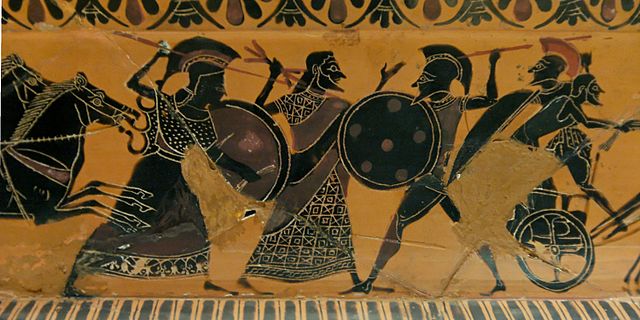In Greek mythology, Cycnus or Cygnus was a bloodthirsty and cruel man who dwelt either in Pagasae, Thessaly or by the river Echedorus in Macedonia.
Zeus parts Athena and Ares, while Kyknos flees in a chariot (right) as Heracles arrives (left), on an Attic black-figured volute-krater, c. 540–510 BCE signed by Nikosthenes (British Museum).
Heracles fights Cycnus, from the Treasury of the Athenians at Delphi.
Ares is the Greek god of war and courage. He is one of the Twelve Olympians, and the son of Zeus and Hera. The Greeks were ambivalent towards him. He embodies the physical valor necessary for success in war but can also personify sheer brutality and bloodlust, in contrast to his sister Athena, whose martial functions include military strategy and generalship. An association with Ares endows places, objects, and other deities with a savage, dangerous, or militarized quality.
Cast of a Roman statue from Hadrian's Villa, copied from a Greek original. Traditionally identified as Ares or Hermes.
Ares, 2nd–3rd century AD, after a Greek bronze original by Alkamenes dated 420 BC,[citation needed], excavated in 1925 in Rome's Largo di Torre Argentina
The Ludovisi Ares, Roman version of a Greek original c. 320 BC, with 17th-century restorations by Bernini
The Areopagus as viewed from the Acropolis.




![Ares, 2nd–3rd century AD, after a Greek bronze original by Alkamenes dated 420 BC,[citation needed], excavated in 1925 in Rome's Largo di Torre Argent](https://upload.wikimedia.org/wikipedia/commons/thumb/e/e7/Ares_Argentina_Montemartini.jpg/450px-Ares_Argentina_Montemartini.jpg)

